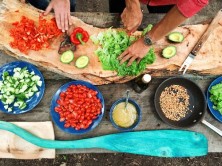What is the Mediterranean Diet?

This way of eating is based on the traditional foods that people who lived around the Mediterranean Sea ate about 50 years ago. Back then, in the mid 20th century, researchers noted that people in Spain, Greece, and Italy lived longer and healthier than Americans. And they had lower levels of heart disease, the #1 killer.
So, they set out to find what was so healthy in this part of the world. And the research keeps coming in. And it’s pretty impressive.
See: What is A Whole Foods Plant-Based Diet
Eating a Mediterranean diet is linked to:
- Less overweight and obesity (it's better than low-fat diets)
- Better blood sugar control (for diabetes and metabolic syndrome)
- Lower risk of heart disease and stroke (and blood markers like cholesterol and triglycerides)
- Reduced risk of Parkinson's and Alzheimer's diseases
- Fewer cancers (breast & colorectal)
- Less premature death
Overall, it’s simply really good for you.
PRO TIP: Recent research even links the Mediterranean diet to better gut microbes! This makes sense when you feed your friendly gut microbes their favourite foods including fibre, fruit, and vegetables.
Here's another bonus: Many people who start eating a Mediterranean diet can stick with it long-term.
How’s that for a healthy, whole-foods, health-promoting not-so-restrictive way to eat?
What To Eat and Drink on a Mediterranean Diet
The Mediterranean diet is chock full of healthy whole foods.Foods like:
- Fruits and vegetables
- Nuts and seeds
- Legumes
- Whole grains
- Fish and seafood
- Extra virgin olive oil
- Herbs and spices
These foods are full of vitamins, minerals, antioxidants, healthy fats, and fibre. And they’re often eaten in social settings where the food (and the company) is enjoyed.
The go-to beverage for the Mediterranean diet is water. Coffee and tea are also regularly consumed (without the addition of lots of cream and/or sugar). And yes, red wine (about 1 glass per day) is very commonly enjoyed.
Some foods and drinks that are eaten in moderation include:
- Poultry
- Eggs
- Cheese and yogurt
What Foods to Ditch on a Mediterranean Diet
There are many foods and drinks that are not part of the Mediterranean diet. Not surprisingly, this includes many highly processed and unhealthy foods like:- Desserts
- Processed meats
- Sauces and gravies
- Sugar-sweetened beverages or fruit juices
- Refined grains and oils (including hydrogenated oils)
- Too much salt
- Added sugars
And if alcohol is a problem for you, you can also ditch the wine.
See: Why Alcohol Can Prevent You From Losing Weight
The Mediterranean diet also incorporates a different lifestyle. Some things to ditch are being too sedentary, eating alone, and being overly stressed.
See: 44 Ways to Boost Your Mood
In a Nutshell
The Mediterranean diet is a very healthy way of eating. It is a whole-foods diet based mainly focused on plant foods (fruits, vegetables, nuts, seeds, legumes, and whole grains). It also contains fish, olive oil, and herbs and spices. The Mediterranean diet is high in vitamins, minerals, antioxidants, healthy fats, and fibre; all of which are health-boosting from your head to your heart… and the rest of your body.
Don't forget that health involves more than just food. The Mediterranean lifestyle also incorporates regular exercise, eating with people whom you care about, and overall enjoyment of life.
See: 10 Ways to Exercise at Home Without Any Equipment
Do you think you could add or ditch certain foods to get closer to the Mediterranean diet? Do you have a favourite recipe that embodies this way of eating?
Here's a simple recipe to help get you started:
Recipe (Mediterranean): One Pan Roasted Dinner
Serves 44 cod fillets
2 handfuls asparagus, ends removed
1 cup black kalamata olives, drained
3 cloves garlic, thinly sliced lengthwise
4 handfuls cherry tomatoes, halved
3 tbsp olive oil, extra virgin
2 tsp dried dill
2 dashes freshly ground black pepper
1 lemon, sliced
Instructions
Preheat oven to 450ºF and cover a baking sheet with parchment paper.Place the fillets in the middle of the pan. Add the asparagus, olives, garlic, and tomatoes around the fish.
Brush with olive oil and sprinkle with dill and pepper.
Slice lemon and place one onto each fillet.
Squeeze juice from the rest of the lemon onto the vegetables.
Roast in the oven for 10-12 minutes.
Check if fillets are opaque all the way through and flake easily with a fork. If not, then cook for another few minutes.
Serve & enjoy!
Tip: You can substitute another fish for the cod (e.g., salmon).
References:
https://www.cdc.gov/nchs/fastats/leading-causes-of-death.htm
https://medlineplus.gov/ency/patientinstructions/000110.htm
http://www.healthline.com/nutrition/mediterranean-diet-meal-plan
https://www.healthline.com/nutrition/5-studies-on-the-mediterranean-diet#section3
http://www.mayoclinic.org/healthy-lifestyle/nutrition-and-healthy-eating/in-depth/mediterranean-diet/art-20047801v
http://www.medscape.com/viewarticle/866254
http://www.medscape.com/viewarticle/870593
